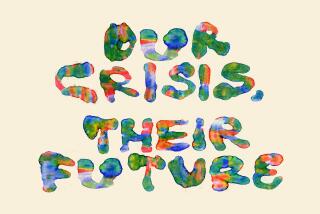HIGH LIFE: A WEEKLY FORUM FOR HIGH SCHOOL STUDENTS : Shopping Guide Makes Grade for Green at Heart
- Share via
Turning pocket change into social change is the idea behind “Students Shopping for a Better World,” the new paperback by the author of “50 Simple Things You Can Do to Save the Earth.”
Teen-agers have more discretionary income than ever before, totaling tens of billions of dollars. And it’s a myth, says author Robin Dellabough, that teens aren’t socially conscious. (According to the U.S. Department of Education, 16-to-19-year-olds volunteered an average of four hours per week in 1991.)
Combining spending power with this social consciousness, teens can help make a better world, Dellabough says. Her 265-page paperback ($4 from the Council on Economic Priorities) rates 166 companies that market 1,000 brands bought by teen-agers.
The Council examined 166 companies for their achievements in the areas of positive environmental policies, minority and women’s advancement and disclosure of information on social programs. These issues, says the council, were chosen through nationwide interviews with hundreds of students age 12 to 20. (The No. 1 issue, according to three-quarters of the students, was the environment.)
Based on the authors’ investigations and students’ priorities, certain companies achieved the “Honor Roll” (three or more A’s and no F’s). Others, however, had two more F’s than A’s and are listed as “underachievers.”
Notable “Honor Roll” companies include Anheuser-Busch, Kellogg (which has been using recycled cardboard for its cereal boxes since 1906), Rhino Records and Campbell Soup. “Underachievers” include Reebok (which failed in women’s advancement potential and in disclosure), Texaco and Wrigley Jr.
In addition to the company and brand ratings, “Students Shopping for a Better World” includes accounts of teen-agers who have chosen to make a difference; an examination of environmental issues; an analysis of how students can effectively wield their consumer power, and a discussion on how students can learn to look at advertising with a more critical eye.
“A patriot is one who thinks other people are not patriots.”
--A. A. Milne
More to Read
Sign up for our Book Club newsletter
Get the latest news, events and more from the Los Angeles Times Book Club, and help us get L.A. reading and talking.
You may occasionally receive promotional content from the Los Angeles Times.









